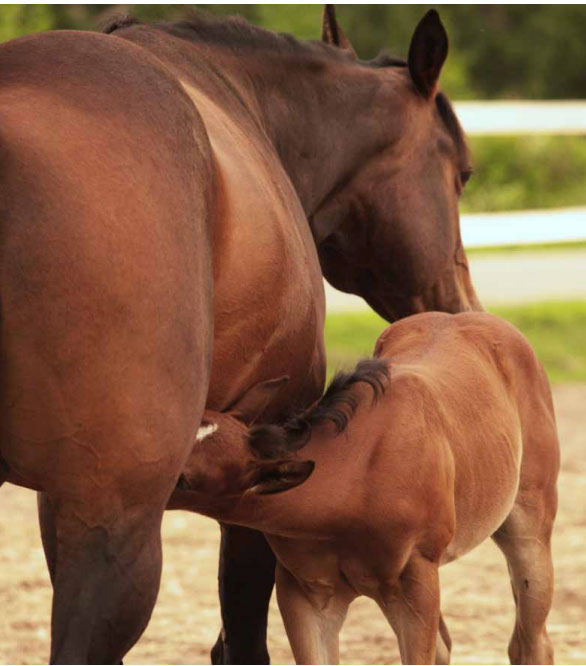Feeding the Lactating Mare

The quality of protein is more important than the quantity
- During lactation, the mare’s mineral needs continue to grow but it is her energy and protein needs that increase the most. An approximate 65% rise in protein needs over what they were in late gestation is observed.
- It is important to note that the percentage of crude protein on a product’s label does not provide any indication at all of the intrinsic quality of the protein that is its digestibility and its amino acid content (protein-building material). Please do not hesitate to ask us about the sources of protein in Purina products.
- Of the 22 amino acids that the horse uses to build protein, some are recognized as being essential in the sense that the horse cannot synthesize them; the best-known ones being lysine, methionine and threonine. The mare must be supplied all the essential amino acids through her feed ration.
- Some of these essential amino acids, notably lysine, are limiting in the sense that they prevent the complete production of the protein if they are not served to the horse insufficient quantities. Therefore, the feed and/or supplement that you choose for your lactating mare must provide her with a sufficient quantity of excellent quality protein, which will deliver a sufficient intake of essential amino acids and will support optimal bone, muscle and tissue growth in the foal.
Be Careful Not to Underfeed the Mare
- The lactating mare’s energy or calorie needs increase by approximately 45% over her needs in late gestation. The calorie intake from her ration therefore must be increased to avoid underfeeding her, a situation that occurs all too often.
- The mare’s calorie needs during this phase vary depending notably on the quality and quantity of milk produced. Indeed, some mares are such good milk producers that it is difficult to maintain good body condition if the amount of feed served per day is not increased significantly. The feed chosen should be formulated for the needs of the lactating mare, which is the case with Evolution Maternity, Omolene Maternity 300, Equilibrium Sport XT and Equilibrium Pro Plus. A feed with a high calorie value will make it easier to maintain good body condition despite lactation requirements.
- The golden rule is the same for any type of horse: adjust the amount of feed served based on the body condition presented by each mare. In early lactation, the body condition score desired is approximately 6 to 6.5.
- During lactation, the mare’s vitamin and mineral needs remain high. A Ration Balancer such as Optimal must usually be added to maintain the vitamin and mineral balance of the ration, as this is crucially important to the healthy growth of the foal whose main food source is its dam’s milk.
What Type of Feed to Serve
- The feed served to the mare ideally should be reduced in unstructured carbohydrates (simple sugars and starch), research having shown that this source of calories, primarily provided by grains, increases the risk of developing growth problems in the foal, especially when served in large quantities. A rich source of essential fatty acids (Omega 3) and highly digestible fibre, providing the mare with a suitable amount of quality protein and a high intake of vitamins (A, D3 , E, B complex) and minerals (copper, zinc, calcium, phosphorus, selenium) is also recommended. Evolution Maternity is the feed that best fits this description, notably due to its low starch content.
- Hay, if it is of good quality and dust free, should be served on a free-choice basis. Grass-based hay, harvested early in the season and containing approximately 30% legumes, is a good choice at this stage, as it increases the mare’s intake of calories, protein and certain minerals.
- Milk production begins to decline from the first month of lactation and declines even further after the second month. The nutritional value of the milk also diminishes rapidly from the third month of lactation and, for this reason, the foal should already, at this stage, be used to eating a feed and/or supplement containing vitamins and minerals specifically designed for its needs. This is the case in particular for the Evolution Maternity feed and Optimal supplement. The foal’s body condition score will determine whether or not the calories provided by the feed are needed.
An Often Forgotten Nutrient
- Water plays a dominant role in the life of all horses, but for the lactating mare, it is extremely important, since milk production requires high consumption of water. For the average size mare (approx. 450- 550kg) adding 25g of white salt (100% sodium chloride) twice daily to her meals, and or providing free choice salt blocks, is recommended to ensure optimum water intake.
- Don’t forget the water consumption of the mare and her foal when they are outdoors, especially if they spend a lot of time there, which should in fact be always the case to grow a healthy and mentally balanced foal! Your mare and foal represent an important investment.
Contact your Purina equine nutrition consultant to ensure your program is balanced with the right maternity product for your farm.
